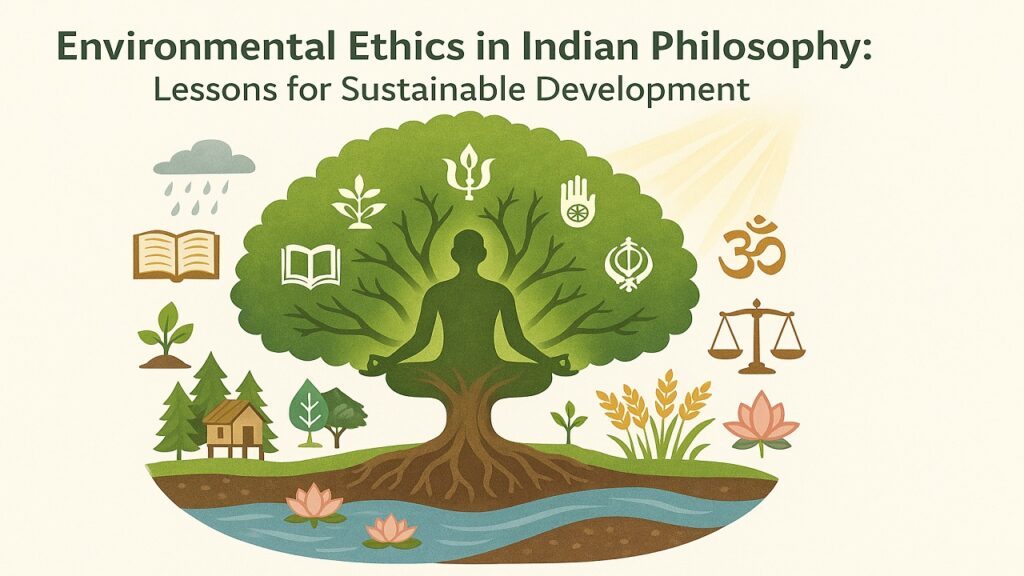Environmental Ethics in Indian Philosophy: Lessons for Sustainable Development
Context

- Ancient Indian philosophy and Ayurveda embed environmental ethics in water, soil, and spirit.
- As India advances climate resilience and sustainable farming, these teachings offer a moral framework for governance and policy.
- UPSC relevance: Connects philosophical thought, sustainability, and climate action.
1. Environmental Ethics: Core Principles
- Nature as consciousness: Caring for Earth is a sacred duty (Dharma).
- Holistic worldview: Pancha Mahabhutas link human and planetary health.
- Moral stewardship: Harm to soil, water, or air = harm to self.
- Ahimsa & interdependence: All beings, elements, and microbes deserve non-violence and respect.
- Spiritual sustainability: Practices like rainwater harvesting, seasonal cropping, and sacred groves arise from this ethos.
2. Perspectives from Indian Traditions
- Vedic/Upanishadic: Universe as a sacred organism; “Mata Bhumih Putro Aham Prithivyah” promotes Earth stewardship.
- Ayurveda: Environmental health is essential for human well-being; soil, water, and air are living entities.
- Jainism: Ahimsa extends to all life; Aparigraha models restraint and coexistence.
- Buddhism: Nature is interdependent; compassion (Karuna) guides sustainable action.
- Sikhism: Guru Nanak’s “Pavan Guru, Pani Pita, Mata Dharat Mahat” teaches environmental care as devotion (Seva).
3. Global Environmental Philosophies
- Deep Ecology: All life has intrinsic value; supports ecocentrism.
- Utilitarian Environmentalism: Decisions weighed by human benefit; e.g., cost-benefit analyses.
- Ecofeminism: Links exploitation of nature and women; emphasizes care and interconnectedness.
4. Challenges
- Commercialisation of spirituality (Ahimsa/Dharma reduced to marketing).
- Urban alienation: Loss of connection with natural rhythms.
- Policy-practice gap: Laws measure compliance, not ethical responsibility.
- Cultural dilution: Pollution and overconsumption violate Vedic ecological principles.
- Climate-modernity dilemma: Balancing growth and ecological restraint.
5. Way Forward
- Education: Include Vedic ecology, Panchabhuta harmony, and Ahimsa in NEP 2020.
- Policy fusion: Link Ayurveda principles with Jal Jeevan, Namami Gange, PM-PRANAM.
- Community stewardship: Engage temples, panchayats, faith trusts.
- Technology for wisdom: Use AI, GIS, satellite mapping to protect sacred sites.
- Global advocacy: Showcase Ecological Dharma at COP-30 and UNESCO.
Conclusion
- Prakriti (Nature) and Atman (Self) reflect a unified consciousness.
- Harmonising water, soil, and spirit transforms environmental protection into spiritual evolution.
- India can pioneer a global ethic of compassionate sustainability, integrating moral duty and ecological stewardship.
Source : Times of India
